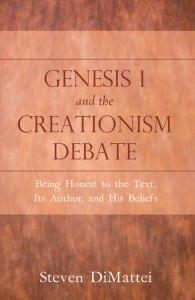I rarely post here anymore since my more recent and extensively more active site, contradictionsinthebible.com, has been the focus of my attention. But I think I’m going to change all that, and start posting excerpts from a recent book I’m working on. It’d be nice to get some feedback from the public on these matters.
The book is tentatively titled Conflicting Stories and Competing Histories: How and Why the Bible’s Authors Rewrote, Altered, and Contradicted Each Other’s Texts. My one-liner about the book and its aims might be laid out as follows: The Bible’s authors consciously adopted, altered, and rewrote the texts and traditions they inherited, and in so doing left behind numerous contradictory stories and even “histories” in what later generations of readers labeled the Bible. The primary purpose of this book is to demonstrate this claim and to discuss how and why this happened, and the ramifications that this awareness might have on how we perceive and interact with the Bible today.
You’ll notice that I am suggesting a whole new approach to understanding Bible contradictions, or articulated more accurately, a whole new approach to understanding the texts that went into the making of the Bible—namely, not from our subjective views, constructed belief systems, opinions about the texts, etc., but from those of the authors! This book doesn’t argue that there are contradictions in the Pentateuch. This has already been an established fact in the scholarly community for over 300 years! The public doesn’t possess this knowledge largely because they’ve been misinformed and derailed by individuals, whether Christian apologists, television evangelists, theologians, or atheists, who themselves are ignorant (lack the knowledge) of these matters. Talk about the Bible’s contradictions in the public arena or on the internet has largely been done, and continues to be done, by non-specialists in the field who are actually ignorant of the Bible’s textual history, composite nature, who wrote its texts, to whom, why and when, in what historical and literary contexts, and the voluminous scholarship already published over the last two centuries on these matters. You can read about the evolution of this discover in Did Moses write the Torah? part 1 and part 2, and How Scholars discovered the Documentary Hypothesis.
Rather, my book sets out to show my readers how the biblical authors themselves interacted with each other’s texts. It introduces readers to the texts that went into the making of the Bible, specifically the Pentateuch, before the label “Bible” was ever applied. It showcases these once separate texts and their unique messages, and encourages an understanding of them each on their own terms by looking at the disagreements, variant beliefs, and contradictions they had with one another. The reader is not only thoroughly introduced to each one of the Pentateuch’s texts as they were intended by their authors and in their own literary and historical contexts, but more importantly how and why later authors (the Deuteronomist and Priestly writer) modified, rewrote, and provided new interpretive frameworks for earlier texts (Yahwist and Elohist), and how and why they were, in the end, redacted together and co-opted as part of a later interpretive framework which we call “the Bible.”
Texts are products of their historical environments, and often express the views and concerns of their authors and audiences. This should hardly come as a surprise. In the ancient world, as the circumstances of history changed, so too the writing of that history. New perspectives or interpretive frameworks were imposed on history, or on previous texts that purported to represent history, in an effort to make sense of new historical conditions. In other words, “histories” or historical narratives of the ancient world often tried to make sense of the present in terms of the past: when present circumstances changed, as they often did, so too did the past, or at least how that past was envisioned. Additionally, later writers felt compelled to rewrite and replace the “historical” narratives of earlier traditions in an effort to make “history” conform with and affirm these writer’s theological and ideological convictions, while on the other hand respond to the needs and concerns of the audiences to whom they wrote. It is the biblical texts themselves, with their competing “histories” that demonstrate these claims. Conflicting Stories and Competing Histories: How and Why the Bible’s Authors Rewrote, Altered, and Contradicted Each Other’s Texts is designed to do just that.
With your indulgence, I think I might start posting sections from Chapter 2 of this project, titled “Using Moses to Rewrite History.” This chapter puts forward with remarkable clarity the central concerns and claims of my book. It gets to the core of what biblical authors were doing with the textual traditions that they themselves inherited. For example, when the author of the book of Deuteronomy sits down to write his text he has at his disposal as sources the earlier Yahwist and Elohist traditions (the subject of Chapter 1). Yet when this author has Moses renarrate the stories told in these sources, he has Moses renarrate them in surprisingly different and often contradictory ways. In other words, the Deuteronomist has Moses renarrate a different “history”! This chapter not only demonstrates this point through ample textual examples, but addresses the questions that emerge from this investigation. Why does the Deuteronomist consciously have Moses change these stories, or alter “history”? What does this tell us about what the Deuteronomist was composing, and his own views about these texts? Can we as a modern culture affirm that the Bible is history when we see one (many) of its authors rewriting earlier “histories” in radically different ways? Did the author of Deuteronomy even view his composition as history?





